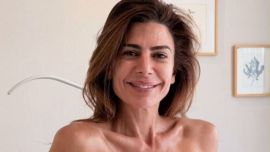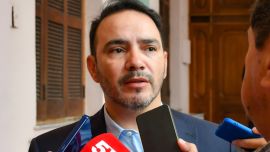Waving massive Argentine flags and their customary light blue handkerchiefs, hundreds of pro-life activists took to the streets of Buenos Aires on Saturday in support of a doctor who was convicted of preventing the non-punishable abortion of a young woman who had raped.
Leandro Rodríguez Lastra, a gynaecologist from the province of the southern province of Río Negro was found guilty of not fulfilling his duties as a public official in a trial last May. Because Argentina, a predominantly Catholic nation, allows abortions in cases of rape and risks to a woman's health, the case of the 19-year-old was considered a "non-punishable" abortion.
“We are seeing a doctor convicted and punished for having saved not just the live of the mother but also the life of a 22-and-a-half-week-old baby, which is an atrocity… and, unfortunately, we are left with no other option than to go out onto the street and protest,” Fernando Secin, a doctor who marched in defence of his colleague, told the AFP news agency.
Bearing a large banner which read "Saving two lives is not a crime," the crowd, which contained fewer people than previous pro-life marches, marched from Plaza de Mayo to Congress carrying dolls of foetuses and newborn children as well as other Catholic imagery.
The convicted doctor, who was present at the march, was honoured as a "Hero for his Bravery" by pro-life activists last May 31 in Buenos Aires.
Argentina now allows abortion only in cases of rape or a risk to a woman’s health. But hundreds of thousands of women continue to undergo illegal procedures each year with thousands of women, mostly poor, hospitalised for complications.
In May, legislators and activists renewed efforts to pass legislation to legalise the procedure. The new bill differs from last year’s because it doesn’t include a section that would have granted doctors the right “to a conscientious objection” to the process. Additionally, the measure would establish prison terms ranging form three months to one year for health establishments or doctors who “unjustifiably delay,” block or refuse to carry out an elective abortion within the terms of the law.
Rodríguez Lastra was accused of administering a medicine to reverse an abortion which was in progress.
"We cannot allow this abuse to the right to life and liberty. With this sentence, the freedom of every honest physician is in danger," former national deputy and activist against the legalisation of abortion, Cynthia Hotton, said.
The case came to court after a complaint by Río Negro provincial deputy and doctor Marta Milesi last year, in the midst of a debate over the legalisation of abortion which was passed in the Chamber of Deputies but rejected in the Senate.
In January 2017 the young woman, whose identity has not been revealed, came to a hospital in Rio de Negro saying she believed that she was pregnant and wanted an abortion. However, she was only given an appointment for March.
On April 2 she was admitted to Moguillansky hospital in Cipolletti, where she was attended to by Rodríguez Lastra who was then-chief of gynaecology.
According to the doctor's testimony, the young woman told him that she had been given an abortion pill by an NGO. The gynaecologist applied a second medication to reverse the abortion and two months later the young woman gave birth.
In Río Negro, the law authorises permitted abortion until week 20 of pregnancy. The young woman said she expressed on multiple occasions, including in letter to doctors, her desire to end her pregnancy.
"I don't want to have this thing. Take it out!" she said, according to the head of social services of the hospital, Analiía Calvo.
"Everyone in the hospital knew that she had been raped. She asked me to intervene, she asked me to help. As a human being and as a woman I was with her at every moment," Calvo said at the trial.
- TIMES/AFP

















Comments